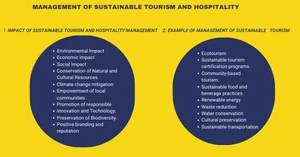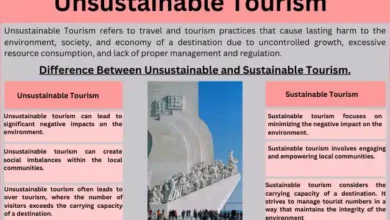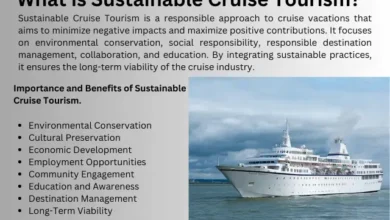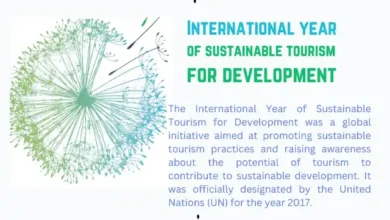
Management of Sustainable Tourism and Hospitality
Sustainable Tourism and hospitality management is the practice of planning, developing, and implementing tourism and hospitality activities in a way that promotes sustainable development, while minimizing negative impacts on the environment, society, and economy. This involves integrating sustainability principles into all aspects of the tourism and hospitality business, including resource management, operations, and marketing.
The goal of sustainable tourism and hospitality management is to ensure that tourism activities benefit local communities and contribute to the conservation of natural and cultural heritage, while also providing a high-quality experience for visitors.
What is the Management of Sustainable tourism?
Sustainable tourism management refers to the process of managing tourism activities in a way that minimizes negative impacts on the environment, society, and economy, while maximizing the positive impacts. It involves integrating sustainability principles into all aspects of the tourism business, including planning, development, operations, and marketing.
Example of Management of Sustainable tourism
There are many examples of sustainable tourism and hospitality practices that are being implemented around the world.
- Ecotourism
- Sustainable tourism certification programs.
- Community-based tourism.
- Sustainable food and beverage practices.
- Renewable energy.
- Waste reduction
- Water conservation.
- Cultural preservation
- Sustainable transportation
Ecotourism
This involves visiting natural areas while conserving the environment and improving the well-being of local people. Ecotourism aims to promote environmental awareness, respect for nature, and sustainable tourism practices.
Sustainable tourism certification programs
These programs assess and certify tourism and hospitality businesses that meet specific sustainability criteria. For example, the Green Key certification program evaluates hotels and other accommodations on their environmental management practices, social responsibility, and sustainable tourism practices.
Community-based tourism
This involves local communities hosting tourists and providing them with unique cultural experiences. Community-based tourism helps to promote local economic development and preserves cultural heritage while reducing negative environmental impacts.
Sustainable food and beverage practices
This involves sourcing local, seasonal, and organic produce and reducing food waste. It also involves promoting sustainable seafood practices and reducing the use of plastic packaging.
Renewable energy
This involves using renewable energy sources such as solar, wind, or hydro power to reduce greenhouse gas emissions and energy costs. Many hotels and resorts are installing solar panels or wind turbines to generate their own energy.
Waste reduction
This involves reducing waste by implementing recycling programs, composting, and reducing the use of single-use plastics. Hotels and resorts can also donate unused food and toiletries to local charities or social enterprises.
Water conservation
This involves reducing water consumption by implementing low-flow fixtures, rainwater harvesting, and water recycling systems. Many hotels and resorts are also encouraging guests to reuse towels and linens to conserve water.
Cultural preservation
This involves preserving cultural heritage by promoting local traditions, arts, and crafts. Many hotels and resorts offer cultural experiences such as cooking classes, music performances, or guided tours to help guests learn about the local culture.
Sustainable transportation
This involves promoting sustainable modes of transportation such as walking, cycling, or public transport. Hotels and resorts can offer bicycles or electric vehicles for guests to use, or provide information on local public transport options.
Framework of Sustainable Tourism and Hospitality management
There are several frameworks that can be used to guide sustainable tourism and hospitality management practices.
- The triple bottom line
- The United Nations Sustainable Development Goals (SDGs).
- Global Sustainable Tourism Council (GSTC) Criteria.
- Green Key Standard.
The Triple Bottom Line
This framework involves considering the economic, social, and environmental impacts of tourism and hospitality activities. This means ensuring that tourism activities contribute to economic development and provide benefits to local communities, while also minimizing negative environmental impacts.
The United Nations Sustainable Development Goals (SDGs)
The 17 SDGs provide a framework for sustainable development, and many of them are relevant to the tourism and hospitality industry. These include goals related to sustainable cities and communities, responsible consumption and production, and climate action.
The Global Sustainable Tourism Council (GSTC) Criteria
The GSTC has developed a set of criteria for sustainable tourism, which can be used to assess the sustainability of tourism and hospitality businesses. The criteria cover four areas: sustainable management, social and economic impacts, cultural heritage, and environmental impacts.
The Green Key Standard
The Green Key is a certification program for tourism and hospitality businesses that meet specific sustainability criteria. The program assesses businesses on their environmental management practices, social responsibility, and sustainable tourism practices.
Impact of Sustainable tourism and Hospitality management
Sustainable tourism and hospitality management can have a significant global impact in various ways.
- Environmental Impact
- Economic impact
- Social Impact
- Conservation of Natural and Cultural Resources.
- Climate change mitigation
- Empowerment of local communities
- Promotion of responsible
- Innovation and Technology.
- Preservation of Biodiversity.
- Positive branding and reputation
Environmental Impact
Sustainable tourism and hospitality management can reduce the negative impact of tourism on the environment. It includes reducing waste, conserving natural resources, and promoting eco-friendly practices.
Economic Impact
Sustainable tourism and hospitality management can contribute to local economies by providing jobs and generating revenue. It can also promote local culture and encourage visitors to spend money on local products and services.
Social Impact
Sustainable tourism and hospitality management can benefit local communities by supporting their cultural heritage, traditions, and local businesses. It can also encourage visitors to respect local customs and traditions and promote cross-cultural understanding.
Conservation of Natural and Cultural Resources
Sustainable tourism and hospitality management can support the conservation of natural and cultural resources. It can help preserve cultural heritage sites, protect endangered species, and promote responsible tourism practices.
Climate Change Mitigation
Sustainable tourism and hospitality management can help mitigate the impact of climate change by promoting sustainable practices, reducing greenhouse gas emissions, and encouraging visitors to reduce their carbon footprint.
Empowerment of Local Communities
Sustainable tourism and hospitality management can empower local communities by involving them in the planning and management of tourism activities. This can help to ensure that the benefits of tourism are distributed fairly and that local communities have a voice in the development of their region.
Promotion of Responsible Travel
Sustainable tourism and hospitality management can encourage visitors to adopt responsible travel practices, such as minimizing waste, conserving resources, and respecting local cultures and customs. This can help to reduce the negative impact of tourism on the environment and local communities.
Innovation and Technology
Sustainable tourism and hospitality management can drive innovation and the adoption of new technologies to improve sustainability. For example, the use of renewable energy sources, such as solar or wind power, can help to reduce greenhouse gas emissions and promote sustainable tourism practices.
Preservation of Biodiversity
Sustainable tourism and hospitality management can support the preservation of biodiversity by promoting the protection of natural habitats and endangered species. This can help to conserve natural resources and promote eco-friendly tourism practices.
Positive Branding and Reputation
Sustainable tourism and hospitality management can enhance the reputation and branding of tourism destinations and companies by promoting sustainable practices. This can help to attract more responsible travelers and differentiate businesses from competitors.
Conclusion
The management of sustainable tourism and hospitality is crucial for the long-term sustainability of the tourism industry. It can reduce negative environmental impacts, support local communities, promote economic growth, and enhance the reputation and marketing of destinations and businesses.
You may like:
10 Reasons Why Sustainable Tourism is Good for the Environment
Why is sustainability needed in tourism product development?




